- Home
- Anthony Ryan
Tower Lord (A Raven's Shadow Novel) Page 9
Tower Lord (A Raven's Shadow Novel) Read online
Page 9
“It’s their custom, Highness,” Sollis said from the other side of the fire. “Doesn’t have to be long, just true.”
“Yes,” Davoka insisted. “Truth only. None of the lies you write down and call poems.”
Truth only. Lyrna concealed a wry smile. How long since I did that? “I have a tale,” she told Davoka. “It’s very strange and, although many swear to its truth, I cannot confirm it. Perhaps if you hear it, you can be the judge.”
Davoka sat in silent contemplation for a moment, brow furrowed. This, it seemed, was an important decision. Eventually she nodded. “I’ll hear it, Queen. And tell you if I hear truth.”
“I’m glad.” Lyrna straightened on her pillow, offering Sollis a gracious smile through the flames. “And you, brother. I would greatly appreciate your opinion of this tale, I call it the Legend of the One-Eyed Man.”
His pale eyes betrayed nothing. “Of course, Highness.”
She paused for a moment to modulate her breathing. She had been trained in oratory, at her own insistence, since her father regarded the art with a measure of disdain; he always did prefer speaking in private. “Over ten years ago,” she began, “in the city we call Varinshold, a man rose to claim lordship over all the outlaws in the city.”
Davoka squinted at her. “Outlaw?”
“Varnish,” Sollis said. Exile, without clan, worthless, thief or scum, depending on the inflection.
“Ahh.” She nodded. “Go on, Queen.”
“This man had always been of vicious temperament,” Lyrna continued. “Given to foul acts of theft, murder and rape, of both boys and maids it’s said. His viciousness was such that all the other outlaws feared him to the extent that they would pay him to be left in peace. But one young thief wouldn’t pay, a young thief with a keen eye and a knife, just like mine.” She held up the throwing knife, gleaming red in the firelight. “And that young thief put his knife into the lord outlaw’s eye. He lingered for days in great pain, thrashing and wailing, and then succumbed to a sleep so deep his minions thought him dead and began to wrap him in canvas in preparation for dumping in the deepest part of the harbour, for such is the resting place of most outlaws in Varinshold. But death hadn’t claimed him, he rose again this lord of outlaws, to be known for ever more as One Eye.
“His anger was great, terrible acts were committed in his name as he sought the young thief, finding to his rage the boy had become a brother of the Sixth Order, and therefore beyond his reach, for now. And here is where the story becomes strange, for it’s said the loss of his eye had birthed in him a great power, a Dark power.”
“Dark?” Davoka asked.
“Rova kha ertah Mahlessa,” Sollis told her. That which is known only to the Mahlessa, the High Priestess.
The Lonak woman got to her feet. “I can hear no more of this,” she stated, avoiding Lyrna’s gaze and stalking away into the darkness.
“It’s a thing they don’t talk of, Highness,” Sollis explained. “To voice a thing gives it substance. They prefer the Dark to have no substance.”
“I see.” Lyrna wrapped her cloak more tightly around her shoulders. “Well, it seems I am left with an audience of one for my story.”
“I’ve heard it before. A one-eyed man with the power to bind others with his will alone. It’s nonsense.” Sollis got to his feet, hefting his bow. “I have the first watch, by your leave, Highness.” He gave a precisely correct bow and walked away.
“How does it end, Highness?” Nersa asked, huddled at the entrance to her own tent, her face a pale oval in fox fur. “What happened to the one-eyed man?”
“Oh, they say he died a predictably ugly death. Slain by the Sixth Order in the bowels of the city.” Lyrna went to her own tent. “Best get some rest, Nersa. I doubt tomorrow will be any easier than today.”
“Yes, Highness. Sleep well.”
◆ ◆ ◆
Sleep well. Any sleep would have been welcome, troubled, dream-filled, fitful, she didn’t care. Any release from this restless squirming in her cage of furs as she stared at the weave of the canvas over her head. A stiff northerly wind was ruffling the tent walls, making them snap and thrum in a most aggravating manner. But it wasn’t this that kept her from sleep, nor had it been for the past five years. Every night! she raged. Even here in this chilled waste, after so many miles on that blasted horse.
It was always the same, every night she would lie abed waiting for sleep, but it wouldn’t come, not until she had spent most of the night hours awash in memory and sheer exhaustion dragged her mind into slumber. Despite the nightly trial she never sought out a healer for a sleeping draught, never partook of wine to excess or dulled her senses with redflower. She hated it, this torment, but she accepted it. It was her due after all.
The memory became clearer when her mind had lost enough sensation of the world beyond her body to give its vision clarity, but not enough to bring the gift of sleep. The old man in the bed, so old, so sunken into age and regret, barely recognisable as her father, barely believable as a king.
She stood in the doorway to his bedchamber, a scroll clutched in her hand, the seal broken. The Alpiran Emperor had done them the courtesy of having it penned in Realm Tongue. The old man’s eyes tracked from her face to the scroll. He waved an irritated hand at the physicians surrounding the bed, a harsh bark coming from his throat, louder than she would have thought him capable. The physicians fled.
The old man’s skeletal claw beckoned to her and she came forward to kneel at his bedside. The voice that came from his throat was a dry rasp, but quick, the words clear. “So that’s it, is it?”
Lyrna placed the scroll on the bed. “Would you like me to read it?”
“Caahh!” he snarled, hand twitching. “Know what it says. No point. They want the boy. They want the Hope Killer.”
She looked down at the scroll, the neat precise text, beautifully scribed. “Yes, in return for Malcius. He’s alive, Father.”
“’Course he is, curses never die.”
Lyrna closed her eyes tight. “Father, please . . .”
“That’s all? Just the boy?”
“His men can leave. They ask for no reparations, no tribute. Just him.”
There was no sound save for the old man’s laboured breathing, like a dry rope dragged through an ungreased block. Lyrna looked up, meeting his eyes, fierce and bright enough to tell her he was still in there, still scheming away in his prison of age and illness. “No,” he said.
“Father, I beg you . . .”
“No!” The shout brought a fit of coughing, doubling him over in the bed. He was so thin and wasted she feared he might snap.
“Father . . .” She tried to ease him back onto the pillow but he shrugged her off.
“You tell them no, daughter!” His eyes blazed at her, blood staining his lips and chin as he drew air into his lungs in painful gulps. “I did not do all this . . . to be thwarted now. You will send the Alpiran ambassador home . . . with a refusal and a statement of our rightful claim to the ports . . . Then you will send the remaining fleet . . . to Linesh with orders for Al Sorna to embark himself and his army . . . They are to return to the Realm with all dispatch . . . When I die, as I surely must before long . . . You will wed him as consort and ascend to the throne . . .”
“My brother . . .”
“Your brother is a waste of my blood!” He thrashed at her, lunging across the bed. “Do you think I have worked . . . for all these years to bequeath my Realm . . . to a fool who’ll see it in ruins within a decade!” The cough took him again, wracking him, blood misting the bedcovers. Lyrna turned to call for the physicians but his claw-hand snared her wrist. For all his age and infirmity he still had a warrior’s grip. “The war, Lyrna . . .” he said, fierce eyes softer now, imploring, “. . . the Realm Guard shattered, the treasury emptied . . . All for you to make it right, rebuild, be the saviour
of this Realm. All for you . . .”
Revulsion engulfed her then, making her flesh burn where he touched her. She tore her wrist away, retreating as he continued to beg, blood now streaming from his mouth. “Please, Lyrna . . . all for you.”
She stood in silence as he raged and flailed, until it seemed all the blood in him had stained the bedclothes and he lay spent and twitching, no more words coming from his hateful mouth. She swallowed, waited until his eyes were closed, until his chest had slowed to little more than a tremor. “Good sirs!” she called, making her voice as shrill with alarm as she could. “Good sirs, the King!”
The physicians returned in a flurry of robes and panic, flocking around the bed like crows around a perished horse. “Do all you can, good sirs!” she implored them. After another half hour of fussing one of the physicians came forward and bowed.
“Sir?” she enquired, tears streaming from her eyes.
“Highness, he has slipped into the final sleep. He will be with the Departed before the sun rises.” He sank to one knee before her, the others following suit.
She closed her eyes, letting the final tear fall, knowing it would be the last she would ever shed for her father. “Thank you, sir. Please see to his comfort.”
She retrieved the scroll and walked from the chamber. The Alpiran ambassador was seated where she had left him, on a bench in the main courtyard. It was a full moon and the marble paving stones were painted a pale blue, the pillars casting deep shadows.
“My lord Velsus,” she greeted him.
Lord Velsus, a tall black-skinned man in a simple robe of blue and white, returned the bow. “Highness. What word from your father?”
She clutched the scroll tight, feeling the parchment crack, ruining the fine calligraphy it held. “King Janus Al Nieren finds your proposal acceptable.”
She knew she was dreaming now, the blue of the moonlight too bright, Lord Velsus’s eyes too mocking as he bowed, then lunged forward to clamp his hand over her mouth . . .
She jerked awake, the shout stifled by the hand trapping her lips against her teeth. Davoka’s eyes were directly above hers, reflecting the bright gleam of the knife in her hand.
CHAPTER FIVE
Frentis
“You are a free man of little property and I am your recently acquired wife. We are travelling to the Alpiran border where you have secured employment as an apprentice slave breeder.” The woman had donned grey clothing of more loosely woven cloth than her previous attire, instructing Frentis to dress himself in similarly mean garb. “We have no children. My mother warned me against you but I didn’t listen. If this latest venture of yours is a failure, I’ll be seeking a decree of annulment, you mark my words.” She shook a finger at him with a shrewish scowl.
They were in her courtyard where a pony and cart had appeared that morning. Horvek had shown her the hidden panel above the axle where a variety of weapons and poisons were concealed. She inspected each dagger, short sword and vial before nodding in satisfaction. “It may be another year before my next visit,” she told the Kuritai as she climbed onto the cart. “Be sure to see the general is well cared for.”
“I shall, Mistress.”
“Let’s be off then, you worthless little man,” she told Frentis with a laugh. “I think I might enjoy this role.”
Frentis took the pony’s reins and walked ahead, guiding them from the courtyard and into the square. A group of slaves were busy cleaning the statue of the man on the horse, the woman’s gaze lingering on the great bronze until they turned a corner and made for the southern gate. “You want to know, don’t you?” she called to him as he tugged the pony onward through the throng. “About the man on the horse.”
He glanced at her over his shoulder but said nothing. She had an uncanny ability to read his unspoken moods, though he strove to keep any sign of curiosity or puzzlement from his face. “Don’t worry,” she assured him. “It’s a long story but I don’t mind the telling. It’ll have to wait till we’re on the road though.”
The journey to the gate took an age of forcing their way through the bustle, the streets of Mirtesk were thick with slaves and free men all seemingly intent on getting to wherever they were going with as much inconvenience to others as possible.
“Out the way, you beggar!” a fat grey-clad shouted at Frentis, trying to force his way past, aiming a cuff at the nose of their pony. There was a momentary loosening of the binding and Frentis kneed the fat man in the groin, leaving him gasping on the cobbled street.
“I do so hate the ill-mannered,” he heard the woman say.
A few streets on his attention was captured by an odd scene. A man stood outside a well-appointed house dressed in the threadbare garb of a slave. He was perhaps forty years old and stood with his head bowed, a placard hung about his neck bearing a single word. Behind him slaves were carrying furniture and ornaments from the house under the eye of an overseer whilst a woman and two children sat and watched from the small courtyard. Frentis was struck by the glances of sheer hatred the woman directed at the man with the placard, matched by the glare of the elder child, a boy of about fifteen. As they trundled past Frentis saw the overseer hand the woman a scroll as one of his slaves fastened a chain with a heavy lock on the door. He picked up the word “annulment” amongst the babble before the scene was lost from view.
“A man with debts he can’t pay,” the woman said from the cart. “Deserves neither family, home nor freedom.”
They had to pay a gate toll of three circles to exit the city and another one to use the road. Frentis was finding the Volarians were very fond of tolls, although he had to admit the road was worth the price; a smooth-surfaced highway of close-packed bricks broad enough to accommodate two heavy wagons side by side, stretching off into the gathering haze. There were no roads in the Realm to match it and he marvelled at the speed with which an army could move along such a route.
“Impressive isn’t it?” the woman commented, once again reading his mood with maddening ease. “Built by the man on the horse, nearly three centuries ago.”
Frentis resisted the urge to glance back at her, although he did want to know more. “Savarek Avantir was his name,” she went on as they continued through the neatly ordered orange groves bordering the road on both sides. “Council-man and general, conqueror of the southern provinces and perhaps the greatest military mind the empire, or even the world has known. But even he knew defeat, husband dear. Like your mad king, he found himself humbled by the Alpirans. For ten years he fought to secure the final province, the last corner of this continent not in our hands. And for ten years the Alpirans spilled an ocean of blood to stop him. Defeat after defeat they suffered, army after army shattered by Avantir’s genius, but they always sent more. Numbers are their strength, not their pitiful, imaginary gods. It was a painful lesson to learn, one which in truth drove Avantir to insanity and the assassin’s blade when his demands for ever more men made the Council worry if their great military genius was in fact something of a liability. It’s always the way with great men, they can’t see the knives of those who live in their shadow.”
She fell to silence and said no more until evening. They made camp at a rest stop some thirty miles south of Mirtesk where she fell into her role of nagging wife with effortless aplomb, scolding him about the camp as she cooked their meal, demanding more firewood in between lecturing him on his obvious failings as a husband, drawing amused glances or looks of sympathy from the other free travellers. The slaves, of course, went about their chores with eyes averted and faces void of any expression.
“Eat it then, you ungrateful cur,” she said, handing him a bowl of goat stew.
His first mouthful convinced him that the woman’s skill with a blade was not matched by her ability with the stewpot. He forced it down, his years in the Order having left him with a stomach capable of accepting the most unappetising fare.
The
woman kept up the charade until the sky grew dark and the other travellers had retired to their tents. “You’re wondering about my connection to him,” she said. Frentis sat unmoving on the far side of their fire, saying nothing.
The woman gave a small smile. “An illustrious forebear perhaps? My great-great-great-grandfather?” Her smile faded. “No. He was my father, dear husband. I am the last of the Avantir line, though I no longer have need of that name, or any other.”
She’s lying, he decided. Playing some trick. She liked to toy with him, as she had proved when she forced him to share her bath the first night in her house, pressing herself against him, hands reaching beneath the water, stroking, her lips soft against his ear, whispering, I can make you . . . He closed his eyes against the memory and the shame of his body’s betrayal.
“It’s true, I assure you,” she said. “Though I don’t expect you to believe it, mired as you are in your superstitions. But you will, dearest.” She leaned forward, eyes intent. “Before our journey is done you’ll have seen enough to make my story seem a dull tale indeed.” She smiled again and rose, moving to the half tent he had secured against the side of the cart. “Time for your husbandly duties, dearest,” she said, disappearing into the shadowed interior of the tent. He sat by the fire until she flared the binding with enough agony to make him follow.
◆ ◆ ◆
They travelled the road for another ten days, orange and lemon groves gradually giving way to ever-thicker forest of unfamiliar trees, growing in height the further south they went. The heat deepened as well, baking the road and making each day a trial of sweaty trudging in front of the cart. He didn’t like this forest, it smelt like rot, birthed a million troublesome bugs and made a din like a madhouse in the night hours.
“It’s called a jungle,” the woman told him. “I expect they don’t have them in your land.”

 Raven’s Shadow Book One: Blood Song (Raven's Shadow)
Raven’s Shadow Book One: Blood Song (Raven's Shadow)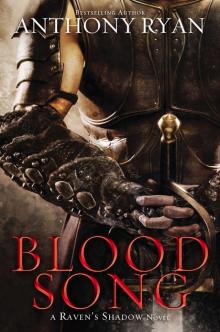 Blood Song
Blood Song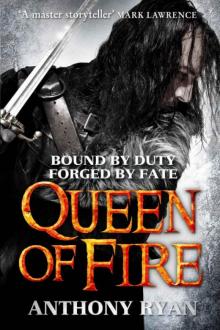 Queen of Fire
Queen of Fire The Waking Fire
The Waking Fire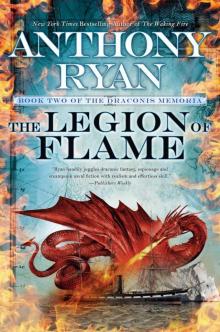 The Legion of Flame
The Legion of Flame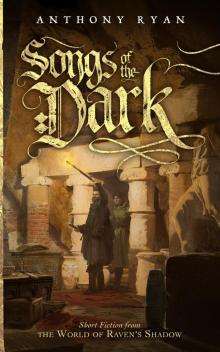 Songs of the Dark
Songs of the Dark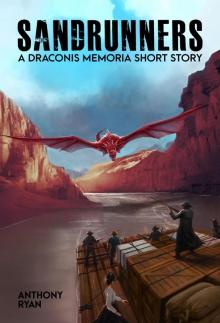 Sandrunners--A Draconis Memoria Short Story
Sandrunners--A Draconis Memoria Short Story Slab City Blues
Slab City Blues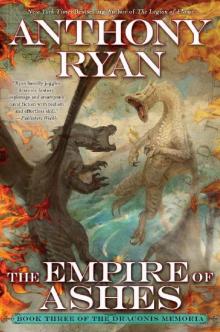 The Empire of Ashes
The Empire of Ashes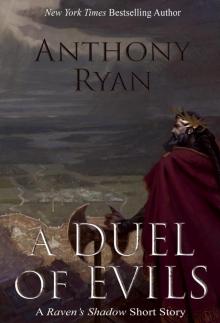 A Duel of Evils
A Duel of Evils The Pariah
The Pariah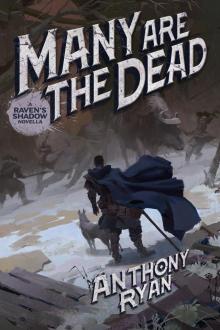 Many Are the Dead
Many Are the Dead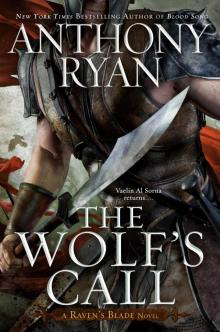 The Wolf's Call
The Wolf's Call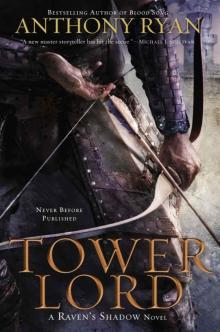 Tower Lord (A Raven's Shadow Novel)
Tower Lord (A Raven's Shadow Novel)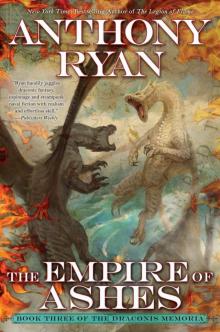 The Empire of Ashes (The Draconis Memoria)
The Empire of Ashes (The Draconis Memoria)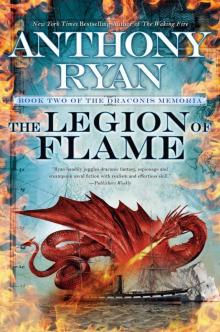 The Legion of Flame (The Draconis Memoria)
The Legion of Flame (The Draconis Memoria) Slab City Blues: A Song for Madame Choi
Slab City Blues: A Song for Madame Choi